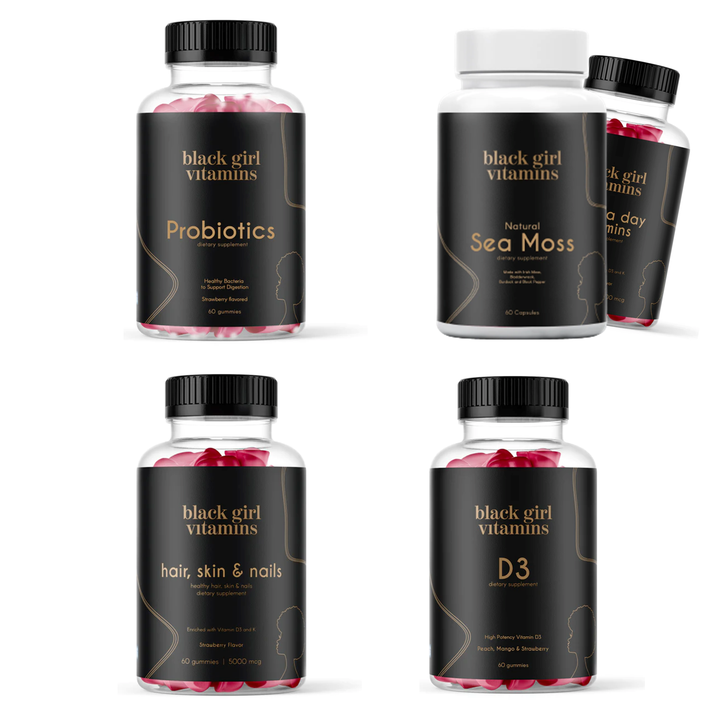PCOS Diet: Which Food and Supplements Are Best for Polycystic Ovary Syndrome

Reviewed by | Bryanne N. Standifer-Barrett MD
As a Black woman with polycystic ovary syndrome (PCOS), you’re probably familiar with many unwanted symptoms. Hirsutism (male-pattern hair growth), irregular periods, hair loss, and weight gain are a few of the many unwanted struggles women with the condition face. While no two women experience PCOS the same way, most women can find some symptom relief by managing their PCOS diet effectively.
You already know the value of using self-care and lifestyle changes to manage your health. Let’s explore how the right foods and supplements can help address your insulin resistance, regulate sex hormones, and make other symptoms of PCOS easier to deal with.
How Can My Diet Improve My Health When I Have PCOS?
Polycystic ovarian syndrome is associated with many different health conditions, such as obesity, irregular menstrual cycles, infertility, and type 2 diabetes. Black women also have a higher risk of high blood pressure, heart disease, and metabolic syndrome. A healthy diet can’t cure PCOS, but it can help manage PCOS symptoms and risks.
High body mass index (BMI), insulin levels, and cholesterol are a few examples of things that can be influenced by your dietary patterns. The DASH diet and Mediterranean diet are just two of the commonly recommended to help regulate your blood sugar levels and reduce your risk of cardiovascular disease. Let’s take a look at what that means for your plate.
What Are the Best Foods To Include in My PCOS Diet?
When you focus on increasing unprocessed whole foods in your diet, it’s easier for your body to stabilize your blood sugar and reduce inflammation. Keeping yourself at a healthy weight can also improve your symptoms. Try to increase the foods you eat that are high in fiber, packed with protein, and filled with healthy fats.
Here are some examples:
High-Fiber Foods
High-fiber foods are a great way to support digestive health and hormonal balance:
- Fruits: Apples, berries, pears, plums
- Non-starchy vegetables: Bell peppers, broccoli, collard greens, zucchini
- Whole grains: Barley, brown rice, oats, quinoa
- Legumes: Beans (navy, black, kidney, and pinto), lentils
Lean Protein Powerhouses
Lean protein sources support healthy muscle mass and blood sugar:
- Chicken: Skinless chicken breast, skinless chicken thighs
- Eggs
- Fish: Salmon, sardines, tuna, mackerel
- Plant-based proteins: Beans, lentils, tempeh, tofu
Good-for-You Fats
Choosing healthy fats can help you feel satiated while supporting your cardiovascular system:
- Avocados
- Fatty fish
- Nuts and seeds, like almonds, chia seeds, flaxseeds, walnuts
- Olive oil
What Foods Should I Avoid if I Have Polycystic Ovary Syndrome?
Limiting sugary or processed foods and refined carbohydrates is an important part of a healthy PCOS diet because these foods can make your blood sugar spike and increase inflammation. Studies suggest saturated fats can make your insulin resistance worse. Low-fat or fat-free dairy products may also aggravate PCOS symptoms.
Reducing problematic foods doesn’t mean you need to give up the dishes you enjoy. If you love fried foods, you may choose to use healthier cooking methods like air frying instead of deep frying.
Let’s review some common foods you’ll want to limit in your PCOS diet:
- High-sugar beverages like sodas, sweetened juices and coffee drinks, and sports and energy drinks
- Processed foods like frozen dinners and microwavable meals, processed meats, and sugary cereals
- Refined carbs like doughnuts and pastries, white bread and rolls, and white rice
- Saturated fats like fast food, fried food, and red meat
- Low-fat or fat-free dairy products
What Supplements Are the Most Helpful for Managing PCOS?
When your body doesn’t get everything it needs from food, supplements can help fill your health gaps. There are several options you may want to consider talking about with your doctor.
As Black folks, we’re more likely to have a vitamin D deficiency than people with lighter skin, so that's a good place to start. Omega-3 fatty acids may help reduce inflammation and normalize your menstruation. Some inositol studies indicate inositol may be a promising option to improve your ovulation and insulin sensitivity.
For the best results, combine a balanced diet and supplement routine with regular physical activity and healthy sleep habits.
Is a PCOS Diet Good for Everyday Living?
Maintaining a healthy diet to manage your PCOS symptoms isn’t about weight loss or only eating “good” foods and cutting out all “bad” foods. As most dietitians will tell you, it’s easier to stick with dietary lifestyle changes when you keep eating the things you enjoy in moderation.
Focus on taking control of your health by increasing the foods that help you feel better and improve your health. Try different foods and recipes, paying attention to how they make you feel. Swap in healthier alternatives or cooking methods. Get great-quality PCOS supplements from a company you trust. Discover what works best for you.
Sources:
Dietary Fat, Insulin Sensitivity and the Metabolic Syndrome | PubMed
Myo-Inositol and D-Chiro-Inositol as Modulators of Ovary Steroidogenesis: A Narrative Review | PMC











